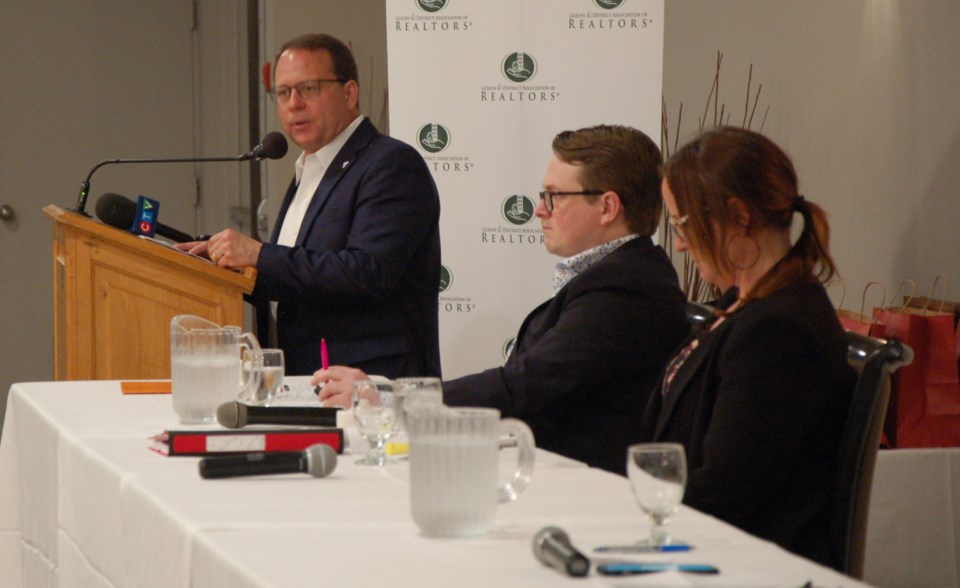Something must be done to address the skyrocketing cost of housing and help first-time homebuyers into the market, agree local candidates for three of the major parties in the upcoming provincial election.
Each made their pitch for voter support during a housing forum hosted by the Guelph chapter of the Ontario Real Estate Association (OREA) for lessening the crisis and improving affordability.
“An entire generation of Ontarians is being priced out of the market and being unable to attain the Canadian dream of home ownership,” commented guest speaker Jason Lagerquist, OREA’s head of government relations.
“Unless you win the lottery or you’re able to access the bank of mom and dad, it’s really tough for the majority of people wanting to break into the market.”
The main cause of the crisis, Lagerquist said, is a lack of housing supply.
“We haven’t built enough homes in the province, probably going back 10 or 15 years.”
The average price of homes sold in Guelph last December topped $1 million for the first time, coming in at $1,063,530, states a report from the Canadian Real Estate Association issued earlier this year.
On the rental side, a March report from the Canadian Mortgage and Housing Corporation shows the average monthly price of a one-bedroom apartment in Guelph is $1,729, with the average two-bedroom unit going for $2,112.
“We need new solutions to old problems,” said Green Party candidate Mike Schreiner. “We have to give first-time homebuyers a fighting chance.”
A Green Party government, Schreiner said, would put an end to exclusionary zoning and allow single-family home properties to be converted into up to four units, build 182,000 affordable housing units, increase supply of the “missing middle” of housing options, end speculation in the housing market as well as blind bidding (the process of making an offer to buy without knowing the amount of other offers made), make surplus land available for affordable housing projects and for-profit developers who commit to offering long-term affordable prices.
He urges the creation of renovation retrofit programs to lessen environmental impacts and reduce utility costs – something he said is largely used by people following a home resale purchase.
Liberal candidate Raechelle Devereaux explained her party intends to build 1.5 million new homes within the next 10 years, if elected to government, along with the creation of an Ontario Homebuilding Corporation to work in partnership with not-for-profit organizations, developers and others to expedite the building of affordable homes.
“Quick action is needed and communities must be involved,” said Devereaux. “This is an issue that affects every single one of us.”
That corporation would focus on first-time homebuyers, she noted, adding other measures include implementing a tax on vacant homes and increased tax incentives to remediate and build on polluted brownfield sites.
She also called for elimination of exclusionary zoning and a return to bonusing, which allows for higher-density developments in exchange for developer-provided community improvement features.
Devereaux stopped short of encouraging the process of blind bidding to end, suggesting reform is needed.
NDP candidate James Parr agreed reform of the bidding process is needed but doesn’t support the idea of eliminating blind bidding without further study of the issue.
He, too, called for an end of exclusionary zoning and supports the implementation of rent control throughout the province.
The average income needed to rent a one-bedroom apartment in Guelph, spending 30 per cent of their income on housing, is between $70,000 and $80,000 per year, while the average local income is $61,000.
“There is definitely a skew there,” said Parr. “If we continue to allow that skew to happen, people will no longer have money to invest and spend in our communities.”
A spokesperson for the local OREA chapter said Progressive Conservative candidate Peter McSherry was invited to attend and initially accepted when invitations went out about a month ago but declined last week.
Candidates representing three other parties weren’t invited because their candidacy wasn’t known when the event was scheduled. They would be Juanita Burnett of the Communist Party, Will Lomker carrying the New Blue banner and Paul Taylor from the None of the Above Direct Democracy Party.
Election day is June 2.


.png;w=120;h=80;mode=crop)
